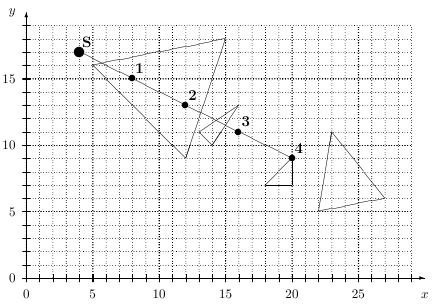University of Toronto ACM-ICPC Tryouts 2012
C: Homemade Asteroids
Pew pew pew!
Everyone loves Asteroids, the classic arcade game involving senselessly blasting asteroids into submission with a spaceship. In fact, you love it so much that you built your very own version to play at home! Unfortunately, it sucks.
Your version of the game is played on a 2D plane, containing your ship (a dot at coordinates (XS, YS)) and N (1 ≤ N ≤ 1000) stationary, triangular, positive-area asteroids. The i-th asteroid has vertices at coordinates (XAi, YAi), (XBi, YBi), and (XCi, YCi). All coordinates are integers with absolute value no greater than 109, and no two objects occupy any of the same space (even on their edges or vertices).
Your game only permits you to fire a single missile, which travels in a straight line, destroying every asteroid that it comes in contact with (even on its edges or vertices). However, it doesn't exactly move very smoothly - instead, it starts at your ship at frame 0, and after every frame, its x-coordinate increases by XD, and its y-coordinate by YD. These values are subject to the same constraints as the coordinates, and at least one of them is guaranteed to be non-zero. After frame F (1 ≤ F ≤ 1000), the missile simply disappears.
There are T (1 ≤ T ≤ 20) scenarios as described above. For each, you'd like to predict how many different asteroids your missile will be able to take out before frame F + 1.
Input
Line 1: 1 integer, T
For each scenario:
Line 1: 2 integers, N and F
Line 2: 4 integers, XS, YS, XD, and YD
Next N lines: 6 integers, XAi, YAi, XBi, YBi, XCi, and YCi, for i = 1..N
Output
For each scenario:
Line 1: 1 integer, the number of asteroids that will be destroyed by the missile
Sample Input
1 4 4 4 17 4 -2 5 16 15 18 12 9 16 13 13 11 14 10 20 9 20 7 18 7 22 5 23 11 27 6
Sample Output
2
Explanation of Sample
The following grid shows the layout of the game, with your ship marked with an "S", and the missile's location at each frame marked with that frame's number:

As can be seen, the missile destroys the first asteroid during frame 1, and then the third asteroid during frame 4. It does not destroy the second asteroid, even though its line of fire goes through it, as it does not intersect the asteroid during any of the frames. It also doesn't destroy the last asteroid, as it stops travelling after frame 4.
All Submissions
Best Solutions
Point Value: 10
Time Limit: 60.00s
Memory Limit: 64M
Added: Oct 02, 2012
Author: SourSpinach
Languages Allowed:
C++03, PAS, C, HASK, ASM, RUBY, PYTH2, JAVA, PHP, SCM, CAML, PERL, C#, C++11, PYTH3










Comments (Search)
It's quiet in here...